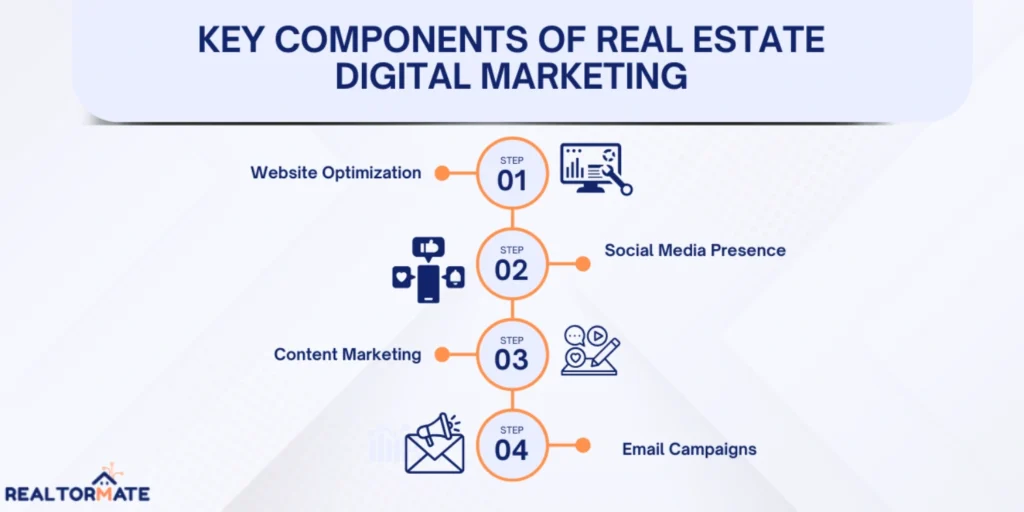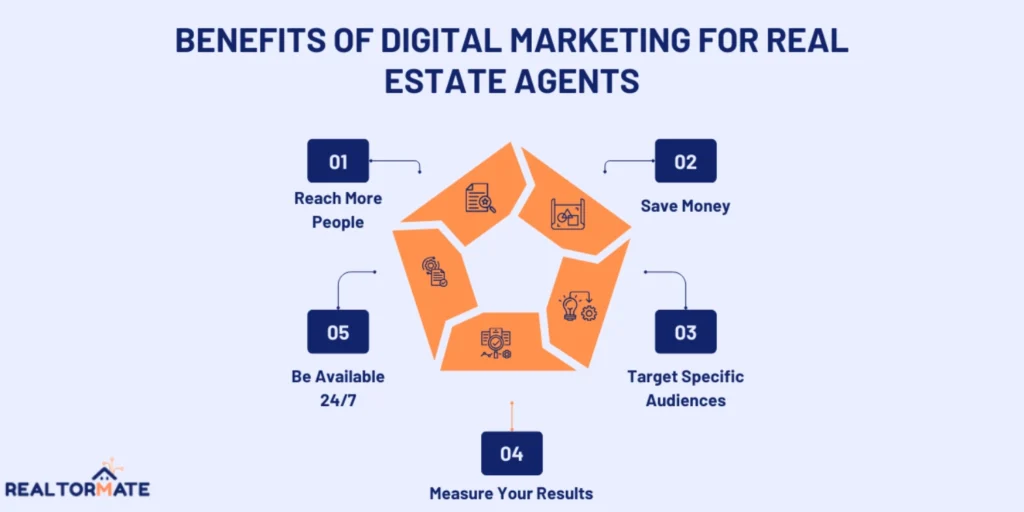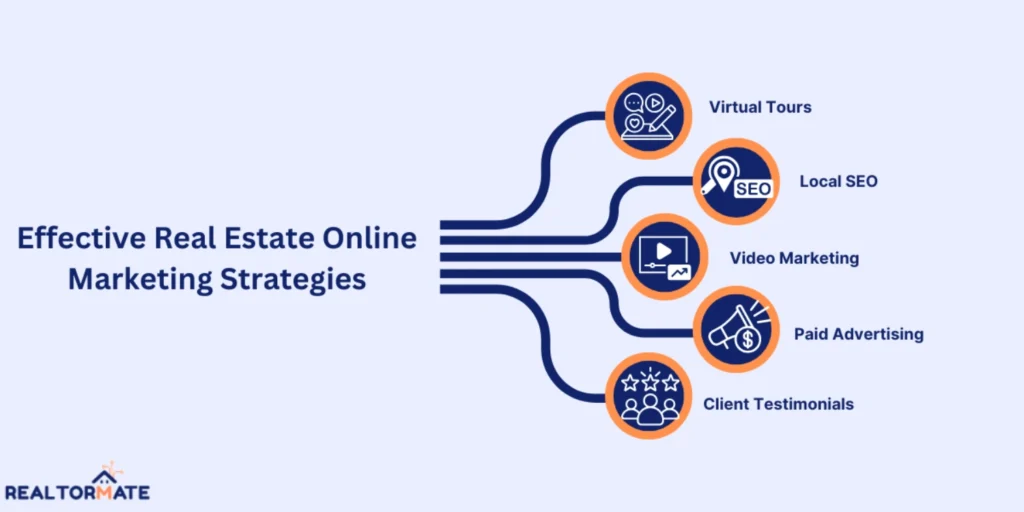Imagine being able to show a house to hundreds of potential buyers without leaving your office. Picture connecting with clients from all over the world with just a few clicks. That’s the power of real estate digital marketing. It’s not just about posting listings online anymore. It’s about creating a strong online presence that attracts clients, builds trust, and helps you close more deals.
In the past, real estate marketing relied on things like yard signs, newspaper ads, and word of mouth to find clients. While these methods still have their place, the internet has opened up a whole new world of possibilities. With real estate digital marketing, you can reach more people, target specific audiences, and measure your results in ways that were never possible before.
But what are the benefits of real estate digital marketing? Does it have any basics and strategies? Let’s find out in this article.
Understanding the Basics of Real Estate Digital Marketing
Before we dive into specific strategies, let’s break down what real estate digital marketing actually means. At its core, it’s about using online tools and platforms to promote your real estate business and properties.
This can include things like:
- Having a professional website,
- Using social media to connect with clients,
- Creating helpful content like blog posts or videos,
- Using email to stay in touch with leads and past clients,
- Making sure your business shows up in online searches.
The purpose of all these activities is to attract more buyers and sellers, showcase your expertise, and ultimately grow your business. It’s about being where your clients are and providing them with the information and services they need.
Key Components of Real Estate Digital Marketing
Now, let’s look at some of the most important parts of a real estate online marketing strategy in more detail:

1. Website Optimization
Think of your website as your online office. It’s often the first impression potential clients will have of you, so it needs to look good and work well. Here are some tips:
- Make sure your site looks great on both computers and mobile devices,
- Include clear, high-quality photos of your listings,
- Make it easy for visitors to search for properties,
- Include helpful information about the buying or selling process,
- Make sure your contact information is easy to find.
Remember, your website isn’t just about showing properties. It’s about showing potential clients why they should choose you as their agent.
2. Social Media Presence
Social media is a powerful tool for real estate digital marketing. It allows you to connect with clients in a more personal way. Here’s how to make the most of it:
- Choose the right platforms (Facebook and Instagram are great for real estate),
- Share a mix of content: Real estate listing marketing, local news, home tips, and personal updates,
- Use high-quality photos and videos to showcase properties,
- Engage with your followers by responding to comments and messages,
- Consider using paid ads to reach more potential clients.
- Don’t forget to use top real estate hashtags to make your posts more discoverable.
The key to social media success is using real estate photography tips and being consistent and authentic. Don’t just sell – build relationships.
Note: these ideas to create real estate social media posts may be helpful.
3. Content Marketing
Content marketing is all about creating helpful, interesting information for your clients and that can be really helpful for digital marketing for realtors. This could include:
- Blog posts about the local real estate market,
- Videos showing how to stage a home,
- Infographics about the buying or selling process,
- Neighborhood guides for different areas you serve, for example, best neighborhoods to live in Toronto.
By providing valuable content, you position yourself as an expert and build trust with potential clients.
4. Email Campaigns
Email might seem old-fashioned compared to social media, but it’s still one of the most effective tools for real estate digital marketing. Use email to:
- Send regular newsletters with market updates and new listings,
- Follow up with leads who have shown interest in a property,
- Stay in touch with past clients to encourage referrals,
- Share your latest blog posts or videos.
The key is to provide value, not just sales pitches. Make your emails something people look forward to receiving.
5. Search Engine Optimization (SEO)
SEO is all about making sure your website shows up when people search for real estate services in your area. Here are some basic tips:
- Use keywords related to your location and services in your website content,
- Make sure your website loads quickly and works well on mobile devices,
- Get listed in online directories like Google My Business,
- Encourage satisfied clients to leave online reviews.
Good SEO takes time, but it can have a big impact on your online visibility.
Benefits of Digital Marketing for Real Estate Agents
Now that we’ve covered the basics, let’s talk about why digital marketing for real estate agents is so powerful:

- Reach More People: With real estate online marketing, you can connect with potential clients all over the world, not just in your local area.
- Save Money: Many digital marketing for real estate strategies are more cost-effective than traditional advertising methods like print ads or billboards.
- Target Specific Audiences: Online tools allow you to focus your marketing efforts on the people most likely to need your services.
- Measure Your Results: With digital marketing, you can track things like website visits, email opens, and social media engagement to see what’s working and what’s not.
- Be Available 24/7: Your website and social media profiles work for you even when you’re sleeping, providing information to potential clients at any time.
Effective Real Estate Online Marketing Strategies
To make the most of your real estate online marketing efforts, try these proven tactics:

- Virtual Tours: Use 360-degree photos or videos to give potential buyers an immersive look at your properties.
- Local SEO: Optimize your online presence for local searches to attract nearby clients looking for properties in your area.
- Video Marketing: Create engaging video content showcasing properties, neighborhoods, and your expertise as a real estate professional.
- Paid Advertising: Use platforms like Google Ads and Facebook Ads to reach targeted audiences and generate quality leads.
- Client Testimonials: Share success stories and reviews from satisfied clients to build trust and credibility.
Read also: Ai for real estate agents.
Digital Marketing for Realtors
The world of digital marketing for realtors is always changing. To stay competitive, you need to keep learning and adapting. Here are some tips:
- Stay up-to-date with new social media features and trends,
- Experiment with new types of content, like live video or podcasts,
- Keep an eye on what successful agents in other markets are doing online,
- Consider working with a digital marketing professional to refine your strategy.
Remember, the most effective digital marketing for realtors is authentic and provides real value to your audience.
Conclusion
Real estate digital marketing isn’t just a trend – it’s the future of the industry. By embracing online strategies, you can reach more clients, showcase your expertise, and grow your business in ways that weren’t possible before. Remember, successful real estate digital marketing is about more than just promoting properties. It’s about building relationships, providing value, and establishing yourself as a trusted expert in your field.
Whether you’re just starting out with a simple website and social media presence, or you’re ready to dive into advanced strategies like SEO and paid advertising, there’s always room to grow and improve your digital marketing efforts.
FAQs
1. How Can I Improve My Real Estate Website for Better Marketing?
Optimize your website by making it mobile-friendly, adding high-quality property photos, integrating an easy-to-use property search tool, and including valuable content like local market insights or buyer guides. Ensure your contact details are visible and include client testimonials to build trust.
2. What Are the Best Social Media Platforms for Real Estate marketing?
Facebook and Instagram are excellent platforms for showcasing listings, connecting with clients, and running targeted ads. LinkedIn can also be valuable for networking with industry professionals, while YouTube is perfect for video tours and property showcases.
3. How Does SEO Help in Real Estate Digital Marketing?
Search Engine Optimization (SEO) improves your website’s visibility in search engines like Google. By using keywords like “homes for sale in [city]” or “real estate agent near me,” creating local content, and getting online reviews, you can attract more organic traffic and qualified leads.
